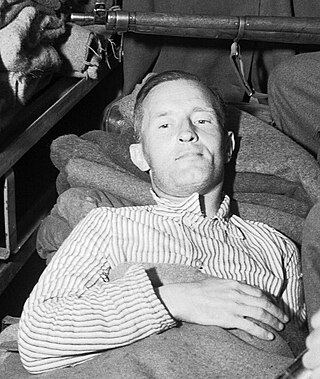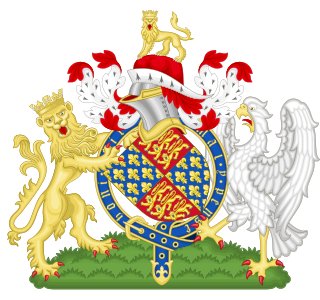
Under the law of the United Kingdom, high treason is the crime of disloyalty to the Crown. Offences constituting high treason include plotting the murder of the sovereign; committing adultery with the sovereign's consort, with the sovereign's eldest unmarried daughter, or with the wife of the heir to the throne; levying war against the sovereign and adhering to the sovereign's enemies, giving them aid or comfort; and attempting to undermine the lawfully established line of succession. Several other crimes have historically been categorised as high treason, including counterfeiting money and being a Catholic priest.

The Treason Act 1351 is an Act of the Parliament of England which codified and curtailed the common law offence of treason. No new offences were created by the statute. It is one of the earliest English statutes still in force, although it has been very significantly amended. It was extended to Ireland in 1495 and to Scotland in 1708. The Act was passed at Westminster in the Hilary term of 1351, in the 25th year of the reign of Edward III and was entitled "A Declaration which Offences shall be adjudged Treason". It was passed to clarify precisely what was treason, as the definition under common law had been expanded rapidly by the courts until its scope was controversially wide. The Act was last used to prosecute William Joyce in 1945 for collaborating with Germany in World War II.

The Criminal Lunatics Act 1800 was an Act of the Parliament of Great Britain that required and established a set procedure for the indefinite detention of mentally ill offenders. It was passed through the House of Commons in direct reaction to the trial of James Hadfield, who attempted to assassinate King George III.

The Treason Act 1695 is an Act of the Parliament of England which laid down rules of evidence and procedure in high treason trials. It was passed by the English Parliament but was extended to cover Scotland in 1708 and Ireland in 1821. Some of it is still in force today.

The Sedition Act 1661 was an Act of the Parliament of England, although it was extended to Scotland in 1708. Passed shortly after the Restoration of Charles II, it is no longer in force, but some of its provisions continue to survive today in the Treason Act 1695 and the Treason Felony Act 1848. One clause which was included in the Treason Act 1695 was later adapted for the United States Constitution.

The Treason Act 1945 was an Act of the Parliament of the United Kingdom.

The Treason Act 1800 was an Act of the Parliament of the Kingdom of Great Britain. It assimilated the procedure on trials for treason and misprision of treason to the procedure on trials for murder in certain cases. It was passed as a result of an attempt on the life of George III by James Hadfield earlier that year. The Criminal Lunatics Act 1800 was passed at the same time.

The Treason Act 1708 is an Act of the Parliament of Great Britain which harmonised the law of high treason between the former kingdoms of England and Scotland following their union as Great Britain in 1707.

The Succession to the Crown Act 1707 is an Act of Parliament of the Parliament of Great Britain. It is still partly in force in Great Britain.

The Treason Act 1543 was an Act of the Parliament of England passed during the reign of King Henry VIII of England, which stated that acts of treason or misprision of treason that were committed outside the realm of England could be tried within England. Those convicted of high treason would have their estates confiscated by the King and then be hanged, drawn and quartered.

The Treason Act 1551 was an Act of the Parliament of England.

The Treason Act 1554 was an Act of the Parliament of England. It is not to be confused with two other Acts about treason passed in the same year, 1 & 2 Ph & M c 9 and 11.

The Treason Act 1746 was an Act of the Parliament of Great Britain. The long title is "An Act for allowing Persons impeached of High Treason, whereby any Corruption of Blood may be made, or for Misprision of such Treason, to make their full Defence by Council."

The Treason (Ireland) Act 1821 is an Act of the Parliament of the United Kingdom. It extended most of the English Treason Act 1695 to Ireland. Previously the 1695 Act only applied to England and Scotland.

The Treason Act 1547 was an Act of the Parliament of England. It is mainly notable for being the first instance of the rule that two witnesses are needed to prove a charge of treason, a rule which still exists today in the United States Constitution.

The Incitement to Mutiny Act 1797 was an Act passed by the Parliament of Great Britain. The Act was passed in the aftermath of the Spithead and Nore mutinies and aimed to prevent the seduction of sailors and soldiers to commit mutiny.

The Jurors (Scotland) Act 1745 was an Act of the Parliament of Great Britain, passed during the Jacobite Rising of 1745. Its long title was "An Act for the more easy and speedy Trial of such Persons as have levied, or shall levy War against His Majesty; and for the better ascertaining the Qualifications of Jurors in Trials for High Treason or Misprision of Treason, in that Part of Great Britain called Scotland." It was one of the Juries (Scotland) Acts 1745 to 1869.

The Sheriffs (Scotland) Act 1747 was an Act of the Parliament of Great Britain which applied only to Scotland. It stated that anyone who was prosecuted on or after 1 April 1748 for treason or misprision of treason could be tried anywhere in Scotland if the crime had been committed in any of the shires of Dunbartain, Stirling, Perth, Kincardine, Aberdeen, Inverness, Nairn, Cromarty, Argyll, Forfarshire, Banff, Sutherland, Caithness, Elgine, Ross, and Orkney. Normally a crime had to be tried in the shire where it had been committed. The Act also said that in such a trial, the jurors could come from adjoining counties, instead of the county where the trial was held.

The Statute Law Revision Act 1888 is an act of the Parliament of the United Kingdom, a Statute Law Revision Act repealing all or part of various earlier acts of Parliament.

The Treason (Ireland) Act 1854 is an Act of the Parliament of the United Kingdom of Great Britain and Ireland. It extended part of the Treason Act 1708 to Ireland, specifically the rules about giving the defendant advance notice of the witnesses and jurors in his case. It was repealed as regards Northern Ireland by the Treason Act 1945, which abolished the unique procedural rules which applied in treason cases. As of 16 January 2020 it remains in force in the Republic of Ireland.













